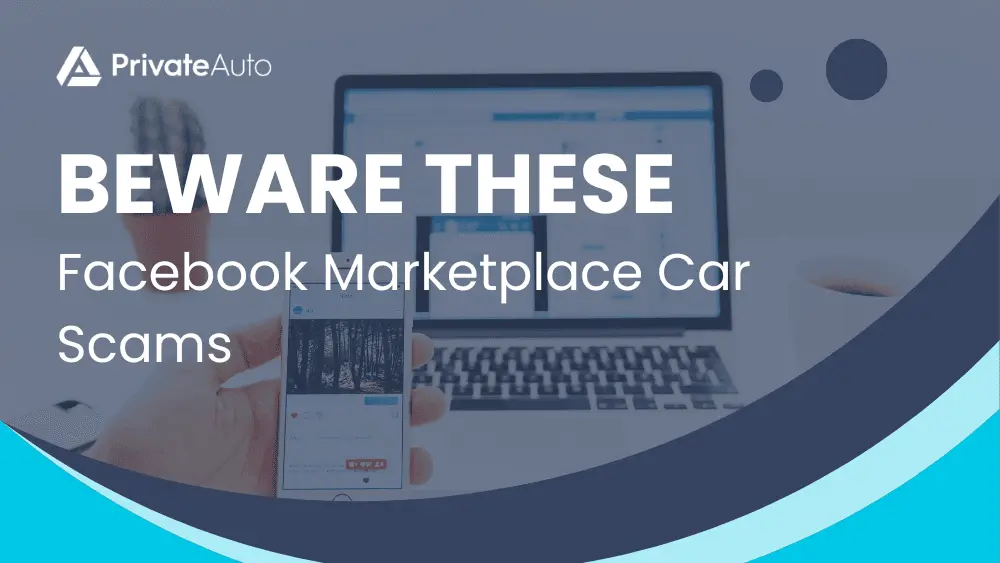We’ll show you a solution that makes private-party transactions safe and easy.
Facebook Scams Targeting Buyers
Facebook Marketplace has a lot of vehicles for sale by owner. Unfortunately, the platform lacks basic safeguards, which fraudsters love. Don’t become their next victim!
Here are the six most common car buying scams to look out for:
- Fake profile scam
- Gift card payment scam
- “Just needs” scam
- Deposit scam
- Phone number verification scam
- QR code scam

Fake profile scam
One: Fake Profile Scam
Fake seller profiles and fake listings are the most common scams on Facebook Marketplace.
These fake accounts promise unbelievable deals to lure in eager car buyers. But they only intend to take payments, not sell anything.
Once you send money for the imaginary car, the bogus account disappears. You’re left empty-handed.
Never send payment for a vehicle without first inspecting it in person and having the seller sign a bill of sale. Only transact with credible, verified sellers—not imposters or fake profiles.
PrivateAuto facilitates safe purchases by:
- Requiring sellers provide VINs to check vehicle history
- Identifying real sellers through identity verification checks
- Using legally binding contracts and paperwork signed electronically
- Holding funds securely until inspection is complete
There is only one simple rule: only pay after you’ve met the real seller and the car. Use PrivateAuto to ensure you never deal with catfish or scammers.
Gift card scam
Two: Gift Card Scam
Got a seller asking for gift card payment? Think twice, that’s a common scam tactic. Gift cards provide an untraceable avenue for fraudsters to move funds
Once you share the gift card codes, your money is as good as gone. Crooks love to use this method for lemons, salvage title vehicles, or stolen cars.
Legit sellers will accept normal payment options that protect you, not gift cards.
“Just needs” scam
Three: Just Needs” Scam
The “Just Needs” scam is the most common; it involves sellers advertising cars with minor issues that supposedly just require small, inexpensive repairs. For example, “just needs a new alternator,” or “it just needs new brakes.” In reality, the stated problem is only the surface symptom of larger mechanical troubles.
This tactic hides major defects under the guise of quick fixes. You have to thoroughly inspect and test these cars rather than just making the stated repair. Or they avoid “just needs” cars altogether, as critical flaws are often being concealed.
So be wary of too-good-to-be-true “just needs” ads. A cheap alternator replacement can’t fix deeper issues. Avoid potential headaches and buy fully vetted cars instead.
Deposit and advance payment scam
Four: Deposit and Advance Payment Scam
The deposit scam starts with sellers listing cars online or in ads at prices below market value. When you start asking about the price and payment options, the seller asks for an upfront deposit of a full payment to supposedly hold the car and take it off the market.
Once you submit the payment, the scammer ceases all contact and disappears with the money without ever providing the vehicle.
The seller preys on potential buyers’ fear of missing out on a deal. But legitimate sellers will only demand deposits once a buyer inspects the car.
Avoid this scam by never paying anything until you’ve met the seller in person, seen the car yourself, and the seller has signed a legitimate bill of sale. Don’t send deposits to strangers just to “secure” a car.
Phone number “verification” scam
Four: Phone Number “Verification” Scam
A seller insists they need to call or text you to “confirm” you’re a real buyer before discussing a sale or showing a car. Once they have your number, they use it for:
- Spam calls and texts
- Identity theft
- Sim swapping scams to access your other accounts
Sharing your phone number with strangers online is risky. Don’t fall for “verification” excuses.
Protect your information avoid scams and invite sellers to transact through DealNow to access secure messaging and instant transaction technology.
QR code scam
Five: QR Code Scam
Since MetaPay is not made for large transactions, most sellers will ask for a different way of receiving money when selling a car on Facebook Marketplace.
If a seller demands you scan a QR code to “pay a deposit” or “finalize payment”, it’s certainly a scam attempt. They either aim to steal your information or trick you into sending money without providing the car.
No legitimate seller would pressure buyers to pay upfront for a car. This tactic is solely used by scammers trying to grab cash quickly.
Facebook Scams Targeting Sellers
While most discussions about scams on Facebook Marketplace focus on the buyer’s perspective, sellers are also vulnerable to fraudulent activity. Scammers are constantly evolving their tactics to take advantage of unsuspecting sellers who are looking to make a legitimate sale.
Here are some common scams that sellers should be aware of and how to protect themselves:
- Fake buyers
- Counterfeit payment
- Phishing scam
- Overpaying
- Using stolen credit cards
- Escrow scam
Fake buyers scam
One: Fake Buyers
Fake buyers plague Facebook Marketplace and other sites such as Craigslist.
These scam accounts lure in sellers by expressing interest and offering a full asking price. However, they never intend to buy your car.
Often, they are trying to get contact details or other personal information. Other times, who knows. Don’t let these jokers waste your time.
Counterfeit payment scam
Two: Counterfeit Payment Scam
Another scam involves fraudsters using counterfeit money to pay for a car during an in-person transaction.
It’s better to not deal in cash payments with strangers. Instead, invite the buyer to DealNow and enjoy smooth dealflow, privacy safeguards, and instant payment transfers.
Phishing scam
Three: Phishing Scams
A phishing scam starts with a supposed buyer contacting you about a listing. They request sensitive information such as the following:
- Bank account or routing numbers
- Credit card details
- Copy of driver’s license
- Social security number
They make seemingly legitimate excuses about needing these details when in reality, they’re stealing your personal data.
Trust your instinct—and use DealNow.
Overpaying scam
Four: Overpayment Scams
This trick starts with the buyer sending a cashier’s check for more than the agreed-upon sale price. For example, you are selling a Toyota Tundra for $50,000, and they give you a check for $55,000.
The scammer will plead with you to refund the $5,000 overage back to them right away, often claiming it was an innocent mistake. They may spin an elaborate story to convince you.
But a few days later, that cashier’s check will bounce when the bank discovers it’s fraudulent. Even though you initially deposited the full $55,000, the bank will pull all those funds back out of your account.
You’ll owe the bank $55,000, while the scammer pockets the $5,000 cash you refunded them. Never accept a check for more than the final agreed sale amount. Insist that any overpayments get corrected on their end.
Stolen credit card scam
Five: Stolen Credit Card Scam
Scammers use stolen cards to buy items on Facebook Marketplace, leaving sellers without money and a car.
A supposed buyer purchases your item with a stolen credit card. The payment seems to go through successfully at first.
But soon the card owner sees the unauthorized charge and reports it. The payment then gets reversed. You’re left empty-handed.
Escrow scam
Six: Escrow Scams
Shady buyers will insist on using a fake escrow service to scam you. They may even create a convincing escrow site.
You agree on a price, and the buyer claims to fund the escrow service. You may even see proof that the escrow company is holding the money—but the funds are still in the fraudster’s control. After you sign over the car and give them the keys, they take off. Then the check bounces, and the scammer and their money are long gone.
Don’t get duped by escrow scams. Choose a reputable escrow service yourself, rather than letting the buyer suggest one. Better yet, just invite the buyer to use DealNow and the platform’s secure instant payment solution.
DealNow gives you escrow-like safeguards in the palm of your hand, so you can sell your car conveniently, securely, and inexpensively.

The solution to all scam problems
DealNow Crushes Car Scams
PrivateAuto is the most user-friendly place to sell your car or buy a private-party used car. But don’t get us wrong—we don’t hate other listing sites.
Facebook Marketplace lets you reach a wide audience. It just doesn’t give you the tools you need to get the deal done. That’s why we created DealNow.
DealNow lets you start a deal anywhere (such as on Facebook Marketplace) and access instant payment technology.
Here’s how it works:
- Invite the seller to DealNow via a custom link.
- Enjoy identity verification, in-app messaging, and a test drive scheduling feature (none of which require you to exchange contact info).
- Meet the seller and test drive and inspect the car.
- You and the seller go together through a step-by-step transaction process in which you each confirm relevant details right in DealNow. From mileage to the VIN to the condition of the vehicle, we help you both prevent any errors.
- You and the seller each electronically sign an official bill of sale. This is stored in your DealNow account as a legal record you can refer to down the road.
- We prompt you to initiate payment after the seller is legally bound to the transaction from e-signing the bill of sale.
- The seller gets a notification of funds received.
- The seller signs over the car title and hands over the keys.
DealNow is so smooth, so safe, and so fast that you’ll never want to buy or sell a car without it.
Facebook Marketplace FAQ
Is it a good idea to buy a car from Facebook Marketplace?
While it’s possible to find good deals on Facebook Marketplace, it can be a risky option due to a lack of transactional security. PrivateAuto, offers a secure platform with more transactional features.
How do I accept a payment on Facebook Marketplace for a car?
On Facebook Marketplace, buyers and sellers are left to their own devices to figure out how to manage large transfers, such as those involved in a vehicle purchase.
We have the solution. Create a private deal room on DealNow, invite the buyer, and enjoy a smooth transaction flow. You’ll be protected, and the buyer will be able to send you up to $1M, instantly and fee-free
How do you negotiate prices on Facebook Marketplace?
Negotiating prices on Facebook Marketplace can be haphazard, as it lacks structured negotiation tools. With PrivateAuto, buyers and sellers can negotiate directly and transparently within the platform.
How do you know if a car is legit on Facebook Marketplace?
Due to the lack of standard verification process, being able to determine the legitimacy of a car on Facebook Marketplace is quite tricky. PrivateAuto verifies sellers and includes a vehicle history report with listings, providing peace of mind for buyers.
Helpful Links

Caleb Whittle
Contributing Author
Caleb Whittle is the Chief Marketing Officer at PrivateAuto. He’s based in Utah and has had a passion for education and learning throughout his life. Helping others understand the nuances of buying & selling cars has become his mission through content creation and writing. His current dream car is a Tesla Model S Plaid.
